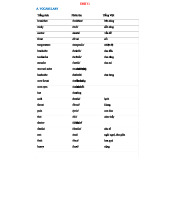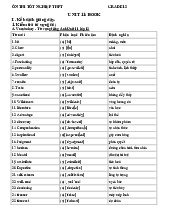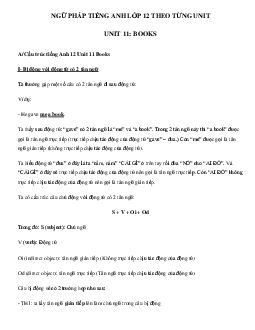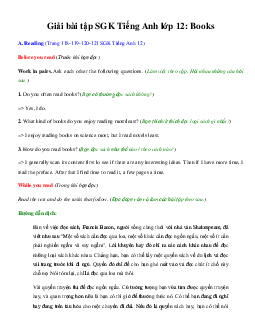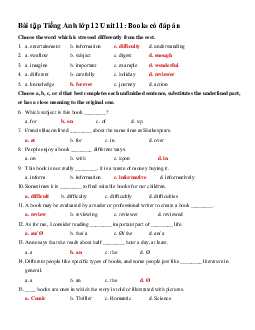

















Preview text:
BÀI TẬP TIẾNG ANH LỚP 12 THEO TỪNG UNIT
UNIT 11: BOOKS CÓ ĐÁP ÁN
Nội dung đề trắc nghiệm tiếng Anh 12 Unit 11
Choose the word which is stressed differently from the rest.
1. a. entertainment b. information c. difficulty d. understanding 2. a. swallow b. subject c. digest d. enough 3. a. imagine b. important c. example d. wonderful 4. a. different b. carefully c. holiday d. reviewer 5. a. knowledge b. forever c. journey d. action
Choose a, b, c, or d that best completes each unfinished sentence, substitutes
the underlined part, or has a close meaning to the original one.
6. Which subject is this book ________? a. for b. on c. of d. up
7. Francis Bacon lived ________ about the same time as Shakespeare. a. at b. for c. in d. over
8. People enjoy a book ________ different ways. a. on b. with c. upon d. in
9. This book is not really ________. It is a waste of money buying it. a. inform b. information c. informative d. informatively
10. Sometimes it is ________ to find suitable books for our children. a. difficult b. difficulty c. difficultly d. difficulties
11. A book may be evaluated by a reader or professional writer to create a book ________. a. review b. reviewing c. reviewer d. reviewed
12. As for me, I consider reading ________ important part of ________ life. a. an/ Ø b. the/ a c. Ø/ the d. an/ a
13. Anne says that she reads about half ________ hour a day, at least. a. a b. an c. the d. Ø
14. Different people like specific types of books, and some people just like
________ literature in general. a. a b. an c. the d. Ø
15. ____ books are ones in which the story is told or illustrated with pictures. a. Comic b. Thriller c. Romantic d. Science
16. Boy, stop reading. ________ the book down and go to bed. a. Take b. Put c. Set d. Pick
17. A book may be studied by students as the ________ of a writing and analysis
exercise in the form of a book report. a. limit b. time c. subject d. interest
18. It is a good book. I think it is interesting enough for you to ________. a. put down b. swallow c. look up d. understand
19. A ________ is a report in a newspaper or magazine in which a writer gives his
opinion of a book, a film, or a play. a. page b. subject c. review d. journey
20. If you ________ a book, you have a brief look at it without reading or studying it seriously. a. dip into b. put away c. pick up d. put down
21. Those letters ________ now. You can do the typing later. a. need typing b. needn't be typed c. need to type d. needn't typing
22. The museum is open to everybody. It ________ between 9am and 5pm. a. visits b. visited c. can visit d. can be visited
23. The train ________ by bad weather. I am not sure. a. might delay b. might be delaying c. might have delayed d. might have been delayed
24. The room ________ once a day. a. should clean b. should be cleaning c. should be cleaned d. should have cleaned
25. Two tablets ________ twice a day to have you recover from the illness quickly. a. must take b. must be taken c. must have taken d. must be taking
26. Theresa walked past me without saying a word. She ________ me. a. can't have seen b. can't see c. can't have been seen d. can be seen
27. I think the match ________. Everybody's gone into the stadium and you can hear them cheering. a. was started b. will be started c. must started d. must have started
28. We found the exam extremely easy. We ________ so hard. a. needn't study b. needn't be studying c. needn't have studied d. needn't have been studied
29. There is plenty of money in our account so those cheques ________ to the bank today. a. needn't be taken b. needn't be taking c. needn't take d. needn't taking
30. The picnic ________ because Peter has just had a traffic accident. a. will cancel b. will be cancelling c. will be cancelled d. will have cancelled Error Identification.
31. Too much television can has negative effects(A) on young minds because of(B)
higher levels of television viewing correlate with(C) lowered academic
performance, especially(D) reading scores.
32. Neil Postman, an author(A) of some great books, pointed out(B) that reading
teaches(C) us to think in a logically connected way, and cultivating(D) a sustained attention span.
33. Reading cannot make(A) your life longer(B), but reading really(C) makes your life more thicker(D).
34. It is really(A) sad how many(B) people have the misconception(C) that reading is bored(D) .
35. There are many benefits that we may be gained(A) by actually(B) taking the
time to read a book instead of(C) sitting in front of the TV or(D) doing some other
forms of mindless entertainment.
Read the passage carefully and choose the correct answer.
Reading, as you know, is a continuous and never ending process. If you do very
little reading, or if you read only material that offers no challenge to your
comprehension, your reading will be of very little use. Once we reach a certain age,
or once our formal schooling is completed, many of us become so restricted in our
choice of. reading that we rarely read any new type of reading experience. We tend
to read only books in our professional or business field, or only inspirational books,
or only our favorite newspapers every morning, or only one magazine for which
we have developed a preference. And the trouble starts here. You should neither
read only for entertainment nor only for information but you should also read for
intellectual growth, for mental stimulation, for enriching your background of
knowledge, for wisdom, and for broader outlook and mature understanding. What
kind of books should you read to continue your intellectual growth, to gain a
background for opinion and for judgment? The answer is simple one: Read books
in fields you have little or no acquaintance with, books that will open for you new
horizons of learning, books that will help you explore new areas of knowledge and
experience, books that will make the world and people more understandable to you.
Sadly, more and more people today are giving up the printed word in favor of
being entertained and informed by watching TV, a popular entertainment ,device
present at almost homes. More and more children are being subjected to TV
programming, perhaps as a babysitter. More than two hours of TV time per day are
now a part of children development, generating physiological and mental problems
that are of growing concern among experts. 36. Reading ________.
a. completely stops when we finish our schooling b. is an endless process c. is of little use d. should be done a little
37. According to the text, ________.
a. new type of reading experience often interests most of us.
b. we should only read for entertainment
c. reading for intellectual growth is necessary
d. we should not read for mental stimulation
38. What kind of books is recommended?
a. Books in fields you have little or no acquaintance with
b. Books that will help you explore new areas of knowledge and experience
c. Books that will open for you new horizons of learning d. All are correct
39. We can learn from the text that today ________.
a. people spend more time watching TV than reading books
b. more and more people enjoy reading
c. most babysitters prefer watching TV
d. most children spend less than 2 hours a day watching TV 40. The writer ________.
a. does not approve of reading process
b. advises us to read as little as possible
c. prefers watching TV to reading d. appreciates reading
Fill in each numbered blank with one suitable word or phrase.
If you want to prepare yourself for great achievement and have more to (41)
______ to your education or your work, try reading more books. (42) ______ up
some of the interestingly informative books and search for well-researched
material that can help you grow.
We should (43) ______ our children to read more books and (44) ______ less time
watching TV. Some people have commented that this is inconsistent. "Why is the
written word a superior way to get information than television?" That is (45)
______ interesting point of view worth further (46) ______. Reading is a skill that
is in much greater demand than the demand for watching TV. There are no jobs
that (47) ______ a person to be able to watch TV but reading is an integral part of
many jobs. The written word is an incredibly flexible and efficient way of
communication. You can write something down and, in no time, it can be (48)
______ to many different people. Not only that, we can (49) ______ vast amounts
of information through reading in a very short time. A good reader can acquire
more information in reading for two hours than someone watching TV can acquire
in a full day. You are able to gain a lot of information quickly because you are a
fast reader with good (50) ______ skills. It will save you massive amounts of time
and you will be able to assimilate vast quantities of information. 41. a. contribute b. gather c. collect d. gain 42. a. Make b. Set c. Take d. Pick 43. a. discuss b. encourage c. suggest d. define 44. a. spend b. apply c. train d. waste 45. a. a b. an c. the d. no article 46. a. explore b. explorer c. exploration d. explorative 47. a. inquire b. tell c. require d. ask 48. a. submitted b. handed c. sent d. communicated 49. a. inhale b. breathe c. eat d. digest
50. a. apprehension b. enjoyment c. comprehension d. entertainment
Read the passage carefully and choose the correct answer.
Have you ever written a book report? First of all, you have to read the book.Your
next step will be to organize what you are going to say about it in your report.
Writing the basic elements down in an outline format will help you to organize
your thoughts. What will you include in the outline? Follow whatever instructions
your teacher has given you. If you are on your own, however, the following
guidelines should help.Let's assume for the moment that you have chosen a work
of fiction. We will start with a description of the book.The description should include such elements as:
1. The setting: Where does the story take place? Is it a real placeor an imaginary
one? If the author does not tell you exactly, where the story is set, what can you
tell about it from the way it is described?
2. The time period: Is the story set in the present day or in an earlier time period?
Perhaps it is even set in the future! Let your reader know.
3. The main characters: Who is the story mostly about? Give a brief description.
Often, one character can be singled out as the main character, but somebooks will have more than one.
4. The plot: What happens to the main character? Warning! Be careful here. Do
not fall into the boring trap of reporting every single thing that happens in the story.
Pick only the most important events. Here are some hints on how to do that. First,
explain the situation of the main character as the story opens. Next, identify the
basic plot element of the story - Is the main character trying to achieve something
or overcome a particular problem? Thirdly, describe a few of the more
importantthings that happen to the main characteras he/ she works toward that goal or solution.
Finally, you might hint at the story's conclusion without completely giving away
the ending. The four points above deal with the report aspectof your work. For the
final section of your outline, give your reader a sense of the impression the book
made up on you. Ask yourself what the author was trying to achieve and whether
or not he achieve dit with you. What larger idea does the story illustrate? How
does it do that? How did you feel about the author's style of writing,the setting, or
the mood of the novel? You do not have to limit yourself to these areas. Pick
something which caught your attention, and let your reader know your personal response to what ever it was.
51. When you write a bookreport, you can organize your thoughts by writing the
basicelements down in an outline format. a. True b. False c. No information
52. The background of the story, place and time, is not necessary in a book report. a. True b. False c. No information
53. Eachbook has only one main character. a. True b. False c. No information
54. In your book report, only important events are told. a. True b. False c. No information
55. When you report a non-fiction work, you needn't express your impression on the book. a. True b. False c. No information
Choose the sentences - a, b, c or d - which is closest in meaning to the printed one.
1.We can’t afford to buy such a luxurious house.
a.The house is so luxurious that we don’t want to buy it.
b.The house cannot be afforded by us.
c.The house is too expensive for us to buy.
d.It was such a luxurious house that we can’t buy it.
2.We have a six o’clock deadline for this work.
a.This work must be finished by six o’clock.
b.This work could be finished by six o’clock.
c.This work might be finished by six o’clock.
d.This work need be finished by six o’clock.
3.Cheques should only be accepted with proof of identity.
a.If you don’t have proof identity, your cheques won’t be accepted.
b.Your cheques will be accepted only if you have proof identity,
c.You shouldn’t accept cheques with proof of identity.
d. Never accept cheques without proof of identity.
4.I’m having a lot of trouble now because I lost my passport last week.
a.If I didn’t lose my passport last week, I wouldn’t be having so much trouble now.
b.If I hadn’t lost my passport last week, I wouldn’t have had so much trouble now.
c.If I didn’t lose my passport last week, I wouldn’t have had so much trouble now.
d.If I hadn’t lost my passport last week, I wouldn’t be having so much trouble now.
5.We must continue our efforts, whether there are problems or not.
a.Regardless of whatever problems, we must continue our efforts.
b.In spite of having problems, we must continue our efforts.
c.Unless there are problems, we must continue our efforts.
d.But for our problems, we must continue our efforts.
Đáp án đề trắc nghiệm tiếng Anh 12 Unit 11
Choose the word which is stressed differently from the rest.
1. c. difficulty; 2. d. enough; 3. d. wonderful; 4. d. reviewer; 5. b. forever;
Choose a, b, c, or d that best completes each unfinished sentence, substitutes
the underlined part, or has a close meaning to the original one.
6. b. on; 7. a. at; 8. d. in; 9. c. informative; 10. a. difficult;
11. a. review; 12. a. an/ Ø; 13. b. an; 14. d. Ø; 15. a. Comic;
16. b. Put; 17. c. subject; 18. b. swallow; 19. c. review; 20. a. dip into;
21. b. needn't be typed; 22. d. can be visited; 23. d. might have been delayed;
24. c. should be cleaned; 25. b. must be taken; 26. a. can't have seen;
27. d. must have started; 28. c. needn't have studied; 29. a. needn't be taken; 30. c. will be cancelled Error Identification. 31. B → because; 32. D → cultivates; 33. D → thicker; 34. D → boring; 35. A → may gain
Read the passage carefully and choose the correct answer.
36. b; 37. c; 38. d; 39. a; 40. d;
Fill in each numbered blank with one suitable word or phrase.
41. a; 42. d; 43. b; 44. a; 45. b; 46. c; 47. c; 48. d; 49. d; 50. c;
Read the passage carefully and choose the correct answer.
51 - a; 52 - b; 53 - b; 54 - a; 55 - c;
Choose the sentences - a, b, c or d - which is closest in meaning to the printed one.
1 - c, 2 - a, 3 - d; 4 -d; 5 - a
